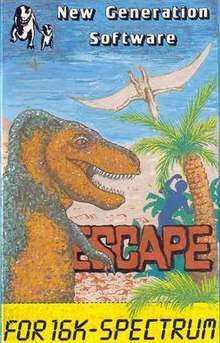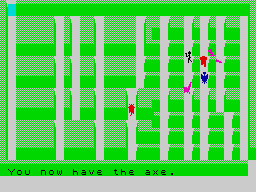Escape (video game)
| Escape | |
|---|---|
 | |
| Developer(s) | Malcolm Evans |
| Publisher(s) | New Generation Software |
| Platform(s) | ZX Spectrum |
| Release | 1982 |
| Genre(s) | Arcade , Maze game |
Escape is an early ZX Spectrum video game developed and released by New Generation Software in 1982.
"Can you ESCAPE from the monsters? You must search through the maze to find the axe which will enable you to break down the door and ESCAPE. But it is not that easy - the Triceratops hides behind the hedges and the Pteranodon soars over the maze to swoop down upon you"[1]
Gameplay
The player has to search a maze displayed in primitive 3D for an axe, which will allow him to break the exit, and escape. He is chased by initially a single monster - each successful escape increases the number of monsters roaming the maze, until level 5, which introduces a pterosaur that will occasionally take off and fly over the hedges, not being restricted to the maze paths.[2]
Upon finding the axe, which is randomly placed for each level, the player speed slows down allowing the monsters to catch up.

The entrance to the maze is in the bottom right, and the exit (still blocked) in the top left.
Reviews
Reviews can be found in the following magazines....
Sinclair User "The game was written by the author of the J K Greye 3D Monster Maze and is one of the best and most original games we have seen for the Spectrum so far" [3]
ZX Computing "This is not, as it may sound a jump on the 'Pacman' bandwagon, but rather an original and absorbing game which can become extremely difficult and frustrating" [4]
Popular Computing Weekly "I would rate two of the games here Escape and Dictator as being amongst the best Spectrum games I have played" [5]
References
- ↑ "Cassette Inlay". Escape. 1982.
- ↑ "Review...". Crash (1): 50. February 1984.
- ↑ "Review...". Sinclair User (8): S9. November 1982.
- ↑ "Review...". ZX Computing (8308): 72. August 1983.
- ↑ Graham Taylor (12 May 1983), "Absolute power..." (PDF), Popular Computing Weekly (19), p. 15, retrieved 2016-03-26
External links
- Escape at SpectrumComputing.co.uk